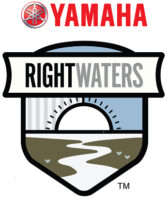Cleanup is necessary to help cure the trash problems in our waterways. It’s up to all of us to keep our waters clean. Be a solution, not the problem. (Contributed Photo)
Yamaha – More Than Just Great Motors
by Tim Huffman
A New Electric Powerhouse
Yamaha Marine introduced its HARMO electric outboard motor system. It’s a 48-volt 3.7-kilowater motor providing 225 pounds of thrust – equivalent to a 9.9 horsepower gas motor. It’s great for waterways with restricted gas motor operation and other applications.
HARMO includes joystick operation for intuitive, quiet operation and a 140-degree total steering angle. Its tilt feature keeps the impeller clear of the water when not in use.
Yamaha says the motor is environmentally friendly, quiet and features great boat control. It’s up to the boat builders and fishermen to learn all the applications for this new breed of motor.

RightWaters
John O’Keefe, Yamaha Public Relations, says, “We have always been recognized as being out front and leading the charge on environmental issues. We have been refocusing and prioritizing with plastics being at the top of the list as a major problem facing our waters.
“Right now, for every three pounds of fish in the ocean there is one pound of trash, and much of it is plastic. At this rate, if nothing changes that ratio will be one to one in 2050 and probably worse as fish die off.”
O’Keefe says the Clean Water Initiative program is to help clean our waters but Yamaha has an invested interest for their own future, too. Yamaha’s customer base is 70% fishermen, so if there are less fish to catch in the future, there will be less need for boats and motors. Yamaha is aware they must help take care of the waters for their customers.
Freshwater Trash
“What starts off in inland will end up in the ocean. Trash from drainage ditches and lakes will eventually end up in our rivers and flow into the ocean. We work with volunteer groups who are incredible. One success story is the Tennessee River Beautiful group who are on track to collect over 100,000 pounds of trash this year alone. During the pandemic, they collected over 60,000 pounds.
“We are the most active marine company when it comes to working with Washington,” says O’Keefe. “We are constantly in front on environmental issues because it’s important to everyone, especially on the current problem of plastics.

“Our engines 150-HP and above come wrapped in clear plastic to protect them. The crate is also wrapped in plastic. We are working with five boat-building partners and we provide a pallet of boxes so when a dealer takes the plastic off the crate and engine, they put it in the box. When the box is full, they put the top on the box and slap a label on it so it can be collected. It’s proving to work so far.”
O’Keefe says Florida State University is has a program for designing a plastic that will break down quickly. Experiments are being done for plastics to have a short life but it’s not practical yet.
Another Florida State project is creating a trash-intercepting device. Yamaha is working with them on a storm drain project. A thunderstorm dumps a few inches of rain and ends up washing everything in the drain and on down the line of waters. So, if that trash can be intercepted before it goes into the marshes, lakes and rivers, it will reduce what gets into our water supplies.
Fishermen have a big impact on what happens to fishing in the future for them, their kids and grandkids
“It’s a big, important project,” says O’Keefe, “so Yamaha is helping and working with universities, professors and students to come up with improved models of trash interceptors that can be affordable, easily deployed and efficient at intercepting storm drain trash.”
What’s In It for Fishermen?
“Fish tested have micro plastics. When plastic breaks down it doesn’t disintegrate, it just keeps getting smaller and smaller. It gets into their system as they eat it. That’s one reason for all of us to be concerned.
 “The bottle that blows out of your boat? You can go back and pick it up because every piece matters. Every little bit we do will make a difference.
“The bottle that blows out of your boat? You can go back and pick it up because every piece matters. Every little bit we do will make a difference.
“In a perfect world, plastic should be separated for recycling. If a fisherman picks up his trash and maybe someone else’s plastic bottle that blows out of the boat, just getting it into the trash at the launch ramp is a good thing. It keeps it out of the water. In fact, many trash facilities are set up to sort the trash and pull the plastic for recycling.”
O’Keefe says the future depends upon what happens right now. It’s critical that we recycle plastics and keep them out of our waters. Fishermen have a big impact on what happens to fishing in the future for them, their kids and grandkids.
Learn more one the Yamaha Global Water Initiative information website
Go here to see how Costa Sunglasses have also joined the clean water initiative.


